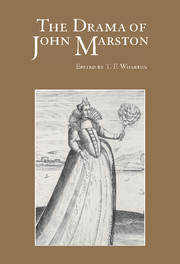Book contents
- Frontmatter
- Contents
- Notes on contributors
- Acknowledgements
- Note on the text
- Introduction
- 1 John Marston at the ‘mart of woe’: the Antonio plays
- 2 John Marston: a theatrical perspective
- 3 Varieties of fantasy in What You Will
- 4 Safety in fiction: Marston's recreational poetics
- 5 Insatiate punning in Marston's courtesan plays
- 6 Touching the self: masturbatory Marston
- 7 ‘Two parts in one’: Marston and masculinity
- 8 The Malcontent: hunting the letter
- 9 The Dutch Courtesan and the profits of translation
- 10 Sexual politics in Marston's The Malcontent
- 11 Marston: censure, censorship, and free speech
- 12 Ill-mannered Marston
- Index
11 - Marston: censure, censorship, and free speech
Published online by Cambridge University Press: 01 October 2009
- Frontmatter
- Contents
- Notes on contributors
- Acknowledgements
- Note on the text
- Introduction
- 1 John Marston at the ‘mart of woe’: the Antonio plays
- 2 John Marston: a theatrical perspective
- 3 Varieties of fantasy in What You Will
- 4 Safety in fiction: Marston's recreational poetics
- 5 Insatiate punning in Marston's courtesan plays
- 6 Touching the self: masturbatory Marston
- 7 ‘Two parts in one’: Marston and masculinity
- 8 The Malcontent: hunting the letter
- 9 The Dutch Courtesan and the profits of translation
- 10 Sexual politics in Marston's The Malcontent
- 11 Marston: censure, censorship, and free speech
- 12 Ill-mannered Marston
- Index
Summary
The career of John Marston as satirist and playwright was perhaps unduly shaped by the exigencies of state controlled drama. Indeed, it seems to have been a specific act of censorship, in addition to cumulative acts of authorized interference with his drama, which brought Marston's life as a working playwright to a premature close in 1608. Moreover, it can be seen how the texts themselves serve to comment upon as well as exemplify the practice of censorship. It is the purpose of this essay, in tracing the inter-relationship between Marston's plays and the vagaries of Elizabethan and Jacobean censorship, to examine how tropes of the latter insistently figure in the dramatist's work, formulating a discourse on poetic liberty, censure, and censorship.
From the outset of his career, in the non-dramatic satires, the mock-Ovidian Metamorphosis of Pigmalion's Image and Certaine Satyres (May 1598) and the Juvenalian Scourge of Villanie (September 1598), Marston betrays a certain anxiety about his deployment of materials, erotic in the former, satiric in the latter. Although licensed, the works were not sanctioned by the authority of a patron, whose role is occupied by the judicious, well-informed reader. Pigmalion's Image begins with the commonplace apologia, as the persona W. K. addresses a prefatory verse ‘To the Worlds Mightie Monarch, Good Opinion’, asking for a safeguarding of his ‘young new-borne Inuention’ and the protection of ‘an Orphane Poets infancier’.
- Type
- Chapter
- Information
- The Drama of John MarstonCritical Re-Visions, pp. 194 - 211Publisher: Cambridge University PressPrint publication year: 2001



